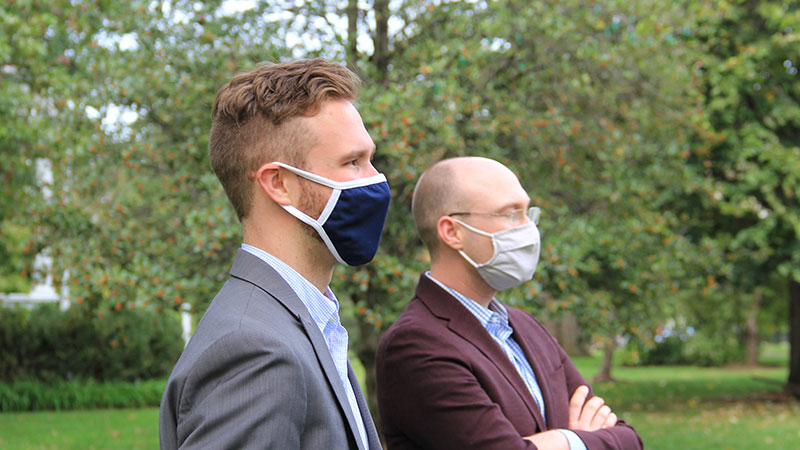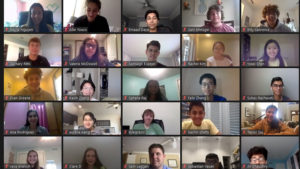
We hope you enjoy these top news stories about TFAS activities, alumni and events this week. Please visit us on social media for additional up-to-the-moment TFAS news and information and sign up to receive weekly updates.
TFAS alumni, staff and faculty continue to make headlines. Read news, analysis and updates by visiting this week’s “Quick Links.”
TFAS Public Policy Fellows Explore Lincoln-Douglas Debates During Fall 2020 Retreat
How can engaging in political discourse shed light on the moral issues of the American experiment of liberty? TFAS Public Policy Fellows considered this question during a day-long retreat in October, exploring the political and historical implications of the Lincoln-Douglas Debates through a series of discussion sessions and a guided tour of President Lincoln’s Cottage.

The retreat began with a luncheon lecture by Chief Operating Officer at CURE, Dr. William B. Allen. Dr. Allen’s lecture, “Illuminating Darkness,” examined some of the arguments and principles at stake during the Lincoln-Douglas Debates, a series of seven debates between Abraham Lincoln and Stephan A. Douglas during the 1858 Illinois state election campaign. Dr. Allen’s lecture encouraged TFAS Public Policy Fellow Calvin Blaylock, PPF ’20, to continue to shed light on the many issues facing American society today through his work as a policy professional.
“Dr. Allen began with an exhortation to engage in politics as a light that illuminates the darkness, and to make that encouragement, he walked us through the Lincoln-Douglas debates,” Blaylock shared.
Blaylock explained that even today, Americans face the challenge of determining right and wrong, and many in society turn to public opinion to judge what is morally right.
“Thus, our task as public policy professionals is to courageously use the institutions we are involved in to reshape public opinion on what is objectively good,” he said. “Dr. Allen’s lecture reinvigorated our Fellowship cohort to remain vigilant in being a light to society.”
Read more about the fall retreat at TFAS.org/PPFFall20.
TFAS High School Programs Successfully Teach Economics to Rising Leaders
TFAS’s high school division, the Foundation for Teaching Economics (FTE) programs, has once again proven to be essential in teaching both students and teachers the “economic way of thinking.”
FTE is providing much needed training and exposition on the economic topics and education methodology so needed in high schools today.” – TFAS Academic Director Anne Bradley
 Despite challenges brought by the global pandemic and subsequent closures by university partners, FTE continues to advance its mission of teaching young minds the importance of economic thinking in everyday life, through highly engaging interactive simulations and classroom lessons. TFAS Academic Director Dr. Anne Bradley reported success in her annual program evaluation.
Despite challenges brought by the global pandemic and subsequent closures by university partners, FTE continues to advance its mission of teaching young minds the importance of economic thinking in everyday life, through highly engaging interactive simulations and classroom lessons. TFAS Academic Director Dr. Anne Bradley reported success in her annual program evaluation.
“The pandemic did not stop successful and interactive FTE programs,” Bradley reported. “The evidence shows that in some cases FTE programs increased the understanding of economic concepts for students by 27 percent!”
Read more about the programs at TFAS.org/FTESummerEval.
Economics Lesson of The Week: Indentured Servitude – A Colonial Market for Labor
TFAS provides resources to help teachers and parents continue the important task of educating our nation’s future leaders. Our “Economics Lesson of The Week” series features new lessons from our high school programming division – the Foundation for Teaching Economics (FTE) – each week.
 This week’s lesson is “Indentured Servitude – A Colonial Market for Labor.” This activity will demonstrate to students, using the context of colonial markets for indentured servants, that prices emerge from the choices made by individual people. Through a series of rounds, students will act as either an agent trying to recruit indentured servants for colonists wanting labor, or a European emigrant considering the possibility of going to the colonies. As students participate in this simulation, they will discover that the specific time period of indentured servitude is determined by an agreed upon price that emerged spontaneously from the voluntary actions of people as buyers and sellers in the market.
This week’s lesson is “Indentured Servitude – A Colonial Market for Labor.” This activity will demonstrate to students, using the context of colonial markets for indentured servants, that prices emerge from the choices made by individual people. Through a series of rounds, students will act as either an agent trying to recruit indentured servants for colonists wanting labor, or a European emigrant considering the possibility of going to the colonies. As students participate in this simulation, they will discover that the specific time period of indentured servitude is determined by an agreed upon price that emerged spontaneously from the voluntary actions of people as buyers and sellers in the market.
TFAS offers a plethora of online lesson plans, readings, handouts, video demonstrations, and hands-on activity guides to teach the “economic way of thinking” in engaging and relatable ways. Visit TFAS.org/FTELessons for a one-stop guide to our available resources.
Post of the Week
TFAS Capital Semester students Sydney Rockwell ’20 and Nina Oeberg ’20 celebrate Election Day 2020 from their dorm in Washington, D.C.
View this post on Instagram
QUICK LINKS
Rita Housseiny ’17 recently finished her graduate work at Georgetown University and is now working as a senior political researcher for the Embassy of the United Arab Emirates in Washington, D.C.
Tugce Bulut ’03 is a featured speaker at TEDx BonnSquare, where she will share insights about pursuing a master’s degree, her career as a consultant and founding her own company.
Mike Porath, Novak ’03, co-authors a piece for Harvard Business Review on how to emotionally cope with negativity in the media.
Luke Zaro ’15 is now an associate attorney with Gibson, Dunn & Crutcher LLP.
Stela Leuca ’07 is a visiting fellow at the German Marshall Fund.
Chris White, Novak ’13, shares how faith leaders across the country are working to ensure nonviolence after the election in the National Catholic Reporter.
Clara Jace ’16 discusses her graduate research about the school of Salamanca, often identified as the first economic tradition in the history of “dismal science” in an episode of the Gwartney Institute’s “Faith and Economics” podcast.
Alexandra Hudson, Novak ’19, shares how families have found joy in spending more time together as the COVID-19 pandemic continues in a piece for USA Today.
Dina Aboughazala ’05, ’08 has been selected along with seven others from media start-ups to be part of the Mentoring Center for the International Journalists Network.
Jenny Goldsberry ’19 is a political reporter for The Salt Lake Tribune.
Laura Vanderkam ’99, Novak ’06, shares tips on controlling emotions during times when polarization is heightened in her column for Forge.
Jeanna Smialek ’11 has a new book deal to write about the Federal Reserve.
TFAS Academic Director Dr. Anne Bradley authored an op-ed for the Foundation for Economic Education on the danger of government bailouts for Big Tech companies.
Krista Gylling ’15 has started a new position as an executive recruitment specialist at U.S. Bancorp.
Jay Rhoden ’17 was promoted to digital manager in the Office of Congresswoman Debbie Dingell.
Matthew Berrick ’18 discusses his experience publishing a book and co-founding a legal magazine in Colin S. Levy’s “Notes from the Front Lines of Legal Innovation.”
Michael Pucci ’98 recently started a new job as the associate director of communications for Purdue Pharma LP.
Jakub Janda ’13 was asked to speak on Russian and Chinese hostile operations in Europe for the European Parliament Special Committee on Foreign Interference.
TFAS alumni Peter Feldman ’04, ’07, PPF ’07, and Kevin Siefert ’06, PPF ’11 are featured on Maverick Pac’s 2020 “Future40” list, which recognizes young professionals in the U.S. who “embody the next generation of leadership in the public and private sector.”
Kurt Couchman ’02, PPF ’07, is a contributor to a new book by the Cato Institute called “A Fiscal Cliff,” which shares perspectives on the national debt crisis in the United States.
Connect with @TFASorg on social media!

